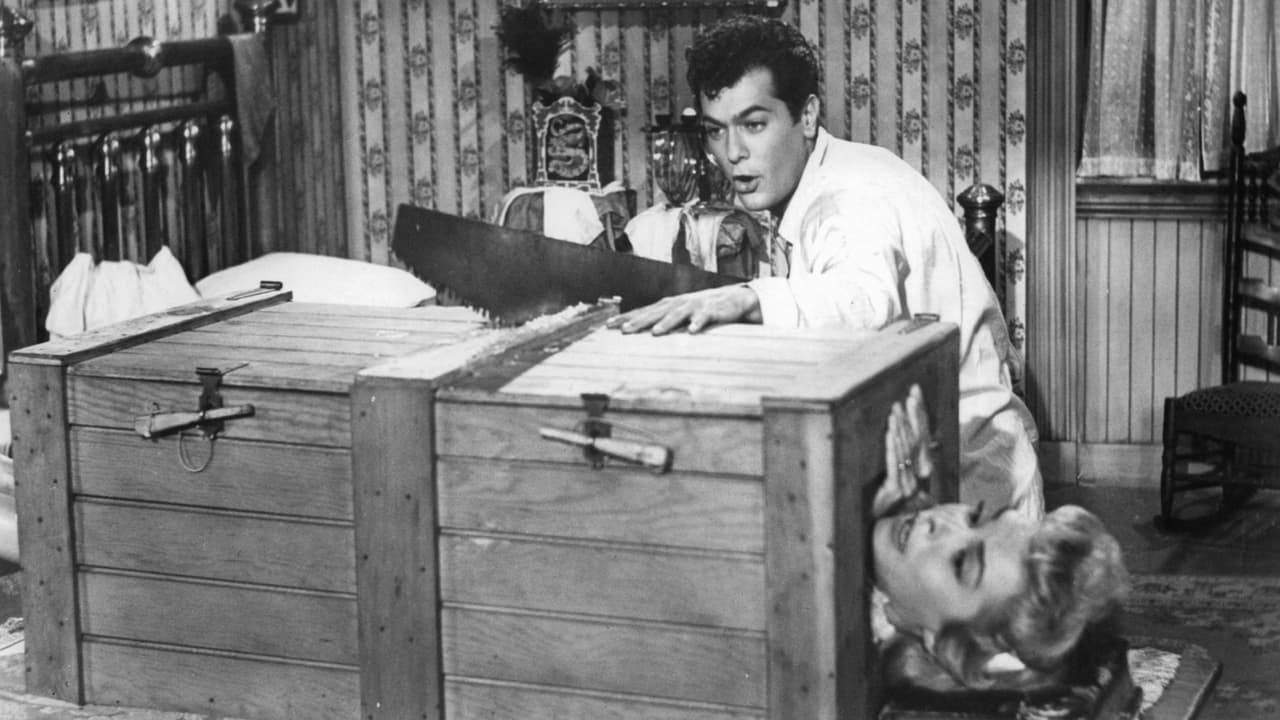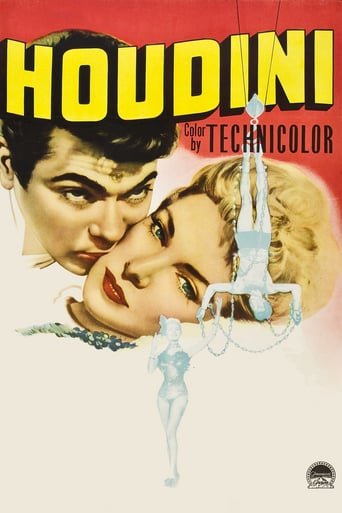kenjha
This colorful biography of the famed magician focuses on his later life and career. It is less than factual but that's not a bad thing, as the primary purpose here is to entertain, not necessarily to inform. And it is quite entertaining for the most part, although it tends to become silly as it touches on premonitions and the supernatural. Houdini was best known for his escape routines and many of them are on display here. Curtis performs well in one of his best early roles, bringing a lot of energy and nicely conveying Houdini's passion for his craft. Leigh, who was married to Curtis at the time, is lovely as his devoted wife in their first screen pairing.
James Hitchcock
"Houdini" is a biopic of the magician and escapologist Harry Houdini, played here by Tony Curtis. Janet Leigh, the real life Mrs Curtis, plays Mrs Houdini; this was one of five movies they made together during their eleven-year marriage. Curtis bore little physical resemblance to the great magician, but may have been cast in the role because of their shared ethnic roots; both were of Hungarian-Jewish origins. By an odd coincidence Houdini's real surname was Weiss (German for "white") and Curtis's was Schwarz (German for "black"). Or perhaps the coincidence is not so odd; both surnames are common ones among Jews from the former Habsburg Empire. (It is said that the Jewish community did not have surnames until they were assigned by German-speaking officials; in some areas the surname Weiss was given to all blonde individuals and Schwarz to all dark ones). Like many Hollywood biographical films, this one plays fast and loose with the facts of its subject's life. In particular the film shows Houdini dying on stage after an escape stunt, the "Chinese Water Torture Cell", goes wrong, whereas in reality his death was attributed to appendicitis, although there have been persistent rumours that he was murdered. (The film does, however, get the date of his death right; he did indeed die on October 31st, Halloween, as shown here). The Torture Cell is said to have been invented by a German magician named Johann von Schweger, who is a great influence on Houdini's life although the two never meet. In reality Houdini invented the Torture Cell escape himself and von Schweger is a fictitious character. Yet when film-makers alter the facts of an individual's life they generally do so for a reason. Filmed biographies are not just a compendium of facts about a person; they are designed to entertain as well as to instruct, and therefore need to give their stories a structure comparable to that of a work of fiction. Houdini is portrayed not just as a historical individual who achieved certain things in his life but as a tragic hero, a man who rises from humble beginnings to a position of great fame but who is destroyed by his own hubris. The early scenes, which deal with Houdini's courtship of and marriage to his wife Bess, are gentle in tone and reminiscent of a romantic comedy. At this period of his life he is a struggling young magician, but at Bess's insistence gives up this life for a job in a locksmith's workshop. The lure of magic, however, proves too strong, and Houdini eventually returns to his old life. He incorporates escapology into his act, and proves to be a great success, especially on a tour of Europe. He returns to America where his success continues, but he finds that he is forced to perform increasingly dangerous stunts, partly in order to hold the interest of the public and partly to giver himself fresh challenges to overcome. The later scenes have a markedly darker, more serious tone. After the death of his mother, and an incident in which an escape goes wrong and he nearly drowns in the frozen Detroit River, he abandons his act in order to pursue a campaign against fraudulent mediums. Returning to the stage after an absence of two years, he succumbs to the temptation, and pressure from the audience, to perform the fatal Torture Cell stunt, despite Bess's passionate opposition. The film was directed by George Marshall, not a particularly well-known name today although a few of his films, such as "Destry Rides Again", "The Blue Dahlia" and his contribution to "How the West Was Won", are still remembered. "Houdini" was in many ways a difficult film to direct. For much of its length it is a relatively light-hearted success story, and yet it ends tragically. It could easily have turned into a broken- backed "film of two halves" with little connection between its comic opening and its tragic ending, but Marshall achieves the difficult task of making the various episodes seem like a coherent whole. In this he is assisted by a good performance from Curtis, who makes Harry Houdini a very likable individual while at the same time revealing something of a darker side to his character. The make-up department also deserves credit for making Curtis, only 28 at the time, look convincingly older in the later scenes. (Houdini was 52 at the time of his death). I must say, however, that Janet Leigh does not seem to age in the same way. "Houdini" is not a particularly deep or significant film, but it is a well-made and enjoyable one. 7/10
Michael_Elliott
Houdini (1953) *** 1/2 (out of 4) Highly entertaining film has Tony Curtis playing Harry Houdini, the legendary escape artist. We see Houdini's early life in the circus, the meeting of his future wife (Janet Leigh) and some of his most famous tricks. It goes without saying that a lot of things are made up in the film, including the bizarre ending, which changes how Houdini died. That one change never made much sense to me as it's pretty common knowledge how the man died but outside of that this is an incredibly entertaining movie that features a pretty standard story but a remarkable performance by Curtis. When I say standard story I'm meaning that the screenplay really doesn't try too hard to get into the mind of Houdini or tell us who he was. Instead of giving us much story depth we instead get to see countless tricks being performed by Curtis and Leigh. Everyone knows that the two were married in real life and that certainly rings true as they have no problems playing husband and wife here. Leigh is very good in her role, which is pretty much just a supporting one but Curtis is where the true magic is. Even though he's one of the most recognizable actors in the history of cinema there isn't a second in this film where I didn't see him as Houdini. Curtis does a brilliant job at transforming himself and he even looks very good while performing the various stunts in the film. I'm not sure how much work he actually did but all of the tricks look very real with the exception of the scene where he cuts Leigh in half. There are many dramatic moments in the film full of suspense and this is true in the best sequence where Houdini is performing above the Detroit River when the ropes break and sends him through the ice. We then get a long sequence with him under the ice trying to find his way out. If people are wanting a hard look bio of the man then they'd be recommended to get a book because they aren't going to find anything here. If they want to see an excellent performance with the master's tricks being performed then this film offers that along with a lot of entertainment.
bkoganbing
Even over 80 years after his demise the name Houdini is still the standard by which magicians of all kinds are measured. David Copperfield, Rick Blaine, these guys are nothing in terms of popularity that Harry Houdini earned. The tricks he did are still being performed or attempted by magicians who want to make a name for themselves.Paramount obtained the rights to the Houdini story from the estate of Harry Houdini from the guy his widow Bess gave it to after she died in 1943. They shelled out some big money at the time to obtain loan out services for Tony Curtis from Universal and Janet Leigh from MGM. The two of them had gotten married the year before and as a couple were getting a lot of publicity as young Hollywood marrieds. Houdini turned out to be the first of five films they did together, six if you count the joint appearance they did in the all star Pepe.Back then, young and in love, Tony and Janet function beautifully as a team as Harry Houdini and his beloved wife Bess. Angela Clarke plays Houdini's mother who was also important in his life. What's not shown is the tension between the two women, they were not friendly. But that's one of several inaccuracies.In fact this biographical film is mostly a work of fiction. But it's pleasant enough entertainment and it was the first film that Tony Curtis starred in that could be considered an A production. In his memoirs he recalls the experience as a pleasant one because of Janet and director George Marshall who he says was a good man to work with and an under-appreciated talent.One thing that is shown is Houdini's interest in the occult after the death of his mother in 1920. He did in fact go around debunking fakers in the field which is field that is saturated with them. One thing not in the film is the fact he came into conflict with Sir Arthur Conan Doyle, creator of Sherlock Holmes, and fervent believer in the reachable spirit world. That in itself would make an interesting film.I'm sure if Harry Houdini were able to comment he'd probably say he liked the film. He'd have to wait for a more accurate film about his life in the Eighties from Paul Michael Glaser and Sally Struthers. But I'd be flattered all to heck to think Tony Curtis was my type.

